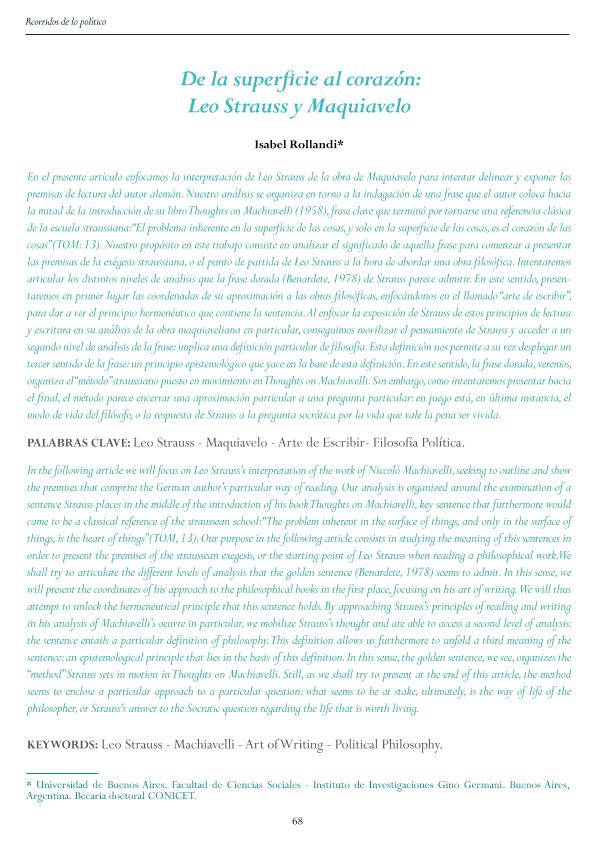Mostrar el registro sencillo del ítem
dc.contributor.author
Rollandi, María Isabel

dc.date.available
2022-11-02T18:16:31Z
dc.date.issued
2018-04
dc.identifier.citation
Rollandi, María Isabel; De la superficie al corazón: Leo Strauss y Maquiavelo; Universidad de Buenos Aires. Facultad de Ciencias Sociales; Unidad Sociológica; 12; 4-2018; 68-78
dc.identifier.issn
2362-1850
dc.identifier.uri
http://hdl.handle.net/11336/176061
dc.description.abstract
En el presente artículo enfocamos la interpretación de Leo Strauss de la obra de Maquiavelo para intentar delinear y exponer las premisas de lectura del autor alemán. Nuestro análisis se organiza en torno a la indagación de una frase que el autor coloca hacia la mitad de la introducción de su libro Thoughts on Machiavelli (1958), frase clave que terminó por tornarse una referencia clásica de la escuela straussiana: “El problema inherente en la superficie de las cosas, y solo en la superficie de las cosas, es el corazón de las cosas” (TOM: 13). Nuestro propósito en este trabajo consiste en analizar el significado de aquella frase para comenzar a presentar las premisas de la exégesis straussiana, o el punto de partida de Leo Strauss a la hora de abordar una obra filosófica. Intentaremos articular los distintos niveles de análisis que la frase dorada (Benardete, 1978) de Strauss parece admitir. En este sentido, presentaremos en primer lugar las coordenadas de su aproximación a las obras filosóficas, enfocándonos en el llamado “arte de escribir”, para dar a ver el principio hermenéutico que contiene la sentencia. Al enfocar la exposición de Strauss de estos principios de lectura y escritura en su análisis de la obra maquiaveliana en particular, conseguimos movilizar el pensamiento de Strauss y acceder a un segundo nivel de análisis de la frase: implica una definición particular de filosofía. Esta definición nos permite a su vez desplegar un tercer sentido de la frase: un principio epistemológico que yace en la base de esta definición. En este sentido, la frase dorada, veremos, organiza el “método” straussiano puesto en movimiento en Thoughts on Machiavelli. Sin embargo, como intentaremos presentar hacia el final, el método parece encerrar una aproximación particular a una pregunta particular: en juego está, en última instancia, el modo de vida del filósofo, o la respuesta de Strauss a la pregunta socrática por la vida que vale la pena ser vivida.
dc.description.abstract
In the following article we will focus on Leo Strauss’s interpretation of the work of Niccolò Machiavelli, seeking to outline and show the premises that comprise the German author’s particular way of reading. Our analysis is organized around the examination of a sentence Strauss places in the middle of the introduction of his book Thoughts on Machiavelli, key sentence that furthermore would came to be a classical reference of the straussean school: “The problem inherent in the surface of things, and only in the surface of things, is the heart of things” (TOM, 13). Our purpose in the following article consists in studying the meaning of this sentences in order to present the premises of the straussean exegesis, or the starting point of Leo Strauss when reading a philosophical work. We shall try to articulate the different levels of analysis that the golden sentence (Benardete, 1978) seems to admit. In this sense, we will present the coordinates of his approach to the philosophical books in the first place, focusing on his art of writing. We will thus attempt to unlock the hermeneutical principle that this sentence holds. By approaching Strauss’s principles of reading and writing in his analysis of Machiavelli’s oeuvre in particular, we mobilize Strauss’s thought and are able to access a second level of analysis: the sentence entails a particular definition of philosophy. This definition allows us furthermore to unfold a third meaning of the sentence: an epistemological principle that lies in the basis of this definition. In this sense, the golden sentence, we see, organizes the “method” Strauss sets in motion in Thoughts on Machiavelli. Still, as we shall try to present at the end of this article, the method seems to enclose a particular approach to a particular question: what seems to be at stake, ultimately, is the way of life of the philosopher, or Strauss’s answer to the Socratic question regarding the life that is worth living.
dc.format
application/pdf
dc.language.iso
spa
dc.publisher
Universidad de Buenos Aires. Facultad de Ciencias Sociales

dc.rights
info:eu-repo/semantics/openAccess
dc.rights.uri
https://creativecommons.org/licenses/by-nc-sa/2.5/ar/
dc.subject
Leo Strauss
dc.subject
Maquiavelo
dc.subject
Filosofía
dc.subject
Sócrates
dc.subject.classification
Teoría Organizacional

dc.subject.classification
Ciencia Política

dc.subject.classification
CIENCIAS SOCIALES

dc.title
De la superficie al corazón: Leo Strauss y Maquiavelo
dc.type
info:eu-repo/semantics/article
dc.type
info:ar-repo/semantics/artículo
dc.type
info:eu-repo/semantics/publishedVersion
dc.date.updated
2022-11-02T15:38:41Z
dc.journal.number
12
dc.journal.pagination
68-78
dc.journal.pais
Argentina

dc.journal.ciudad
Ciudad Autónoma de Buenos Aires
dc.description.fil
Fil: Rollandi, María Isabel. Consejo Nacional de Investigaciones Científicas y Técnicas; Argentina. Universidad de Buenos Aires. Facultad de Ciencias Sociales. Instituto de Investigaciones "Gino Germani"; Argentina
dc.journal.title
Unidad Sociológica
dc.relation.alternativeid
info:eu-repo/semantics/altIdentifier/url/http://unidadsociologica.com.ar/numero-12.html
Archivos asociados
